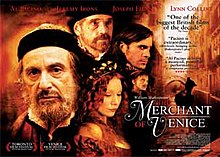This is an old revision of this page, as edited by Soledad22 (talk | contribs) at 21:25, 3 June 2009. The present address (URL) is a permanent link to this revision, which may differ significantly from the current revision.
Revision as of 21:25, 3 June 2009 by Soledad22 (talk | contribs)(diff) ← Previous revision | Latest revision (diff) | Newer revision → (diff) 2004 Italy / UK / Luxembourg film| The Merchant of Venice | |
|---|---|
 | |
| Directed by | Michael Radford |
| Written by | William Shakespeare (story and script), Michael Radford (screenplay) |
| Produced by | Cary Brokaw Michael Cowan |
| Starring | Al Pacino Jeremy Irons Joseph Fiennes Lynn Collins |
| Cinematography | Benoît Delhomme |
| Edited by | Lucia Zucchetti |
| Music by | Jocelyn Pook |
| Distributed by | (MGM)]]Home media |
| Release date | December 29, 2004 |
| Running time | 138 minutes |
| Country | Italy / UK / Luxembourg |
The Merchant of Venice is a 2004 movie based on Shakespeare's play of the same name. It is the first full-length sound film version in English of Shakespeare's play; most other versions are videotaped productions made for television. There had been a British early sound nine-minute short subject production of the trial scene in 1927, with Lewis Casson as Shylock and Sybil Thorndike (Casson's wife) as Portia.
The 2004 "Merchant of Venice" follows the text very closely, only missing lines here and there. The director, Michael Radford, believed that Shylock was Shakespeare's first tragic hero, who reaches a catastrophe due to his own flaws: thus the film does not show Shylock purely as a villain, but partly also as a victim. It begins with text and a montage of how the Jewish community is separated from the Christian population of Venice. One of the last shots made for the film, but not a part of Shakespeare's original play, creates an implication that, as a convert, Shylock would have been rejected because of anti-Christian bigotry from the Jews, and no longer allowed to live in the ghetto.
Cast
The principal roles are Al Pacino as Shylock the Jew, Jeremy Irons as Antonio the merchant, Joseph Fiennes as Bassanio and Lynn Collins as Portia.
Other cast members include:
- Zuleikha Robinson (Jessica)
- Kris Marshall (Gratiano)
- Charlie Cox (Lorenzo)
- Heather Goldenhersh (Nerissa)
- Mackenzie Crook (Launcelot Gobbo)
- John Sessions (Salerio)
- Gregor Fisher (Solanio)
- Ron Cook (Old Gobbo)
- Allan Corduner (Tubal)
- Anton Rodgers (The Duke)
- David Harewood (Prince of Morocco)
Plot
One significant emendation: In Act III, scene i, Tubal tells Shylock that in Genoa, a person "showed me a ring that he had of your daughter for a monkey." Shylock replies "Thou torturest me, Tubal: It was my turquoise; I had it of Leah when I was a bachelor; I would not have given it for a wilderness of monkeys." Nothing more is said of it. However, in an added scene at the end of the film, there is a close-up shot of the turquoise ring on Jessica's finger, implying that Shylock had jumped to the wrong conclusion.
Another significant emendation is that we don't see that Antonio receives the good news that three of his ships were not stranded and have returned safely after all at the end of the film.
Reactions
Most film critics praised The Merchant of Venice, especially for Michael Radford's and Al Pacino's interpretation of the Shylock character. Critics also praised the dark, realistic look of the streets of Venice, for which production designer Bruno Rubeo was honored by the Italian National Syndicate of Film Journalists.
In 2005 the film had a Royal Premiere in the presence of Prince Charles and received a BAFTA nomination for Best Costume Design.
Its worldwide theatrical gross was about $21.3 million, with a production budget of $30 million.
References
External links
- The Merchant of Venice (2004) at IMDb
- Template:Amg movie
- William Shakespeare's The Merchant of Venice at Rotten Tomatoes
- William Shakespeare's The Merchant of Venice at Metacritic
- William Shakespeare's The Merchant of Venice at Box Office Mojo